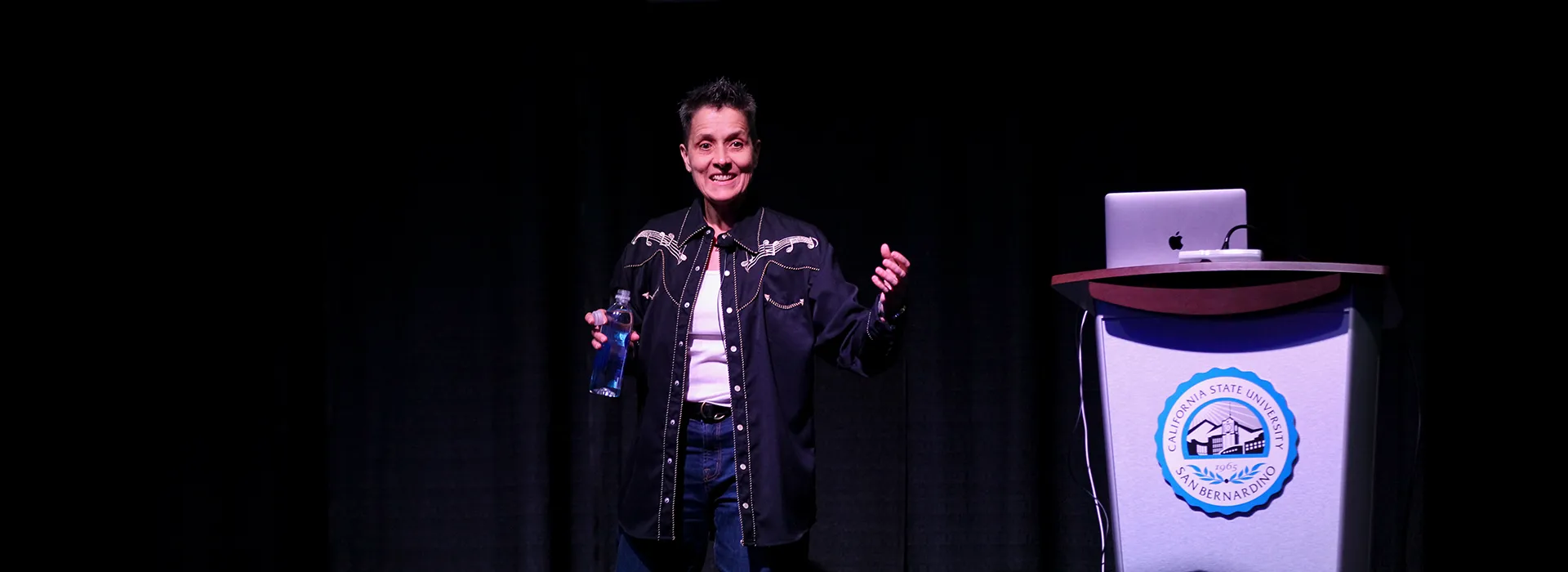Joe Gutierrez Office of Strategic Communication (909) 537-5007 joeg@csusb.edu

Country music lovers and haters gathered in Cal State San Bernardino’s Santos Manuel Student Union on May 2 to listen to a talk by Nadine Hubbs, a historian, theorist, musicologist and professor of women’s studies and music, and faculty affiliate in American culture at the University of Michigan. Hubbs’ discussion explored various topics found in country music, including class, gender, sexuality and race, as part of CSUSB’s Conversations on Diversity series. “Country music, it turns out, is a really useful vehicle for thinking through so many issues of interest to us in society today. In part because it is kind of controversial,” she said during her talk, titled “What Country Music Can Teach Us about Sex, Race, Class, and Immigration in America (A Multimedia Talk for Country Music Lovers and Haters).” Throughout her discussion, Hubbs referenced her award-winning book, “Rednecks, Queers, and Country Music,” and her upcoming book project, “Country Mexicans,” in which she is currently conducting fieldwork with Mexican American music enthusiasts in Texas and California. “All of this work started for me about 15 years ago as an effort to bridge the gap, or I should say the gulf, between what I had experienced in two different worlds,” she said, referencing her upbringing in a small town, working-class environment as a queer individual versus her experience in a more powerful middle class world when she entered academia. She noted how differently they each viewed the world, stating how class played a huge role. “Just about every current social issue, you can think your way through it with country music. And what does that get you? Country music is a hugely circulating media form. There are millions and millions of Americans who are thinking their way through these kinds of issues with country music,” she said. Hubbs shared various country music clips, both new and old, to discuss the themes within each.In order to think with country music, you have to think about what popular music is, she said, which is a form of pleasure and a force in society. “Popular music models how to do gender and sexuality, race and ethnicity, class, region,” she said. “We also influence popular music – society itself is an influence – it goes into popular music and shapes it; popular music shapes society and society shapes popular music. “Under the umbrella of popular music, country music, I would say, stands apart. Country music stands apart from popular music because there is this phrase, and it is the most popular phrase when you ask folks, ‘What do you listen to?’ … ‘Anything but country’ is the most popular answer to that question.” Following her talk, the audience was able to ask Hubbs questions. The CSUSB University Diversity Committee began its Conversations on Diversity series in spring 2005 and strives to bring three renowned speakers to campus on a specific topic of diversity each fall, winter and spring quarter. Topics include, but are not limited to, race, ethnicity, religion, women’s issues, gender and sexual orientation. To learn more about the quarterly series, visit the Conversations on Diversity webpage.